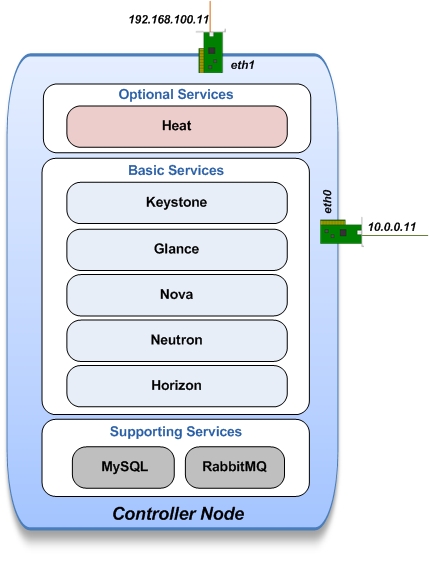Welcome to OpenStack Heat installation manual !
This document is based on the OpenStack Official Documentation for Icehouse.
| Version: | 1.0 |
|---|---|
| Authors: | Marouen Mechtri and Chaima Ghribi |
| License: | Apache License Version 2.0 |
| Keywords: | Heat, OpenStack, Icehouse, Orchestration, Installation, Ubuntu |
Authors:
Copyright (C) Marouen Mechtri
Copyright (C) Chaima Ghribi
Contents
In this guide, we will go over the installation of an awesome OpenStack service !
OpenStack Heat !
Heat is an openstack service that handles the orchestration of complex deployments on top of OpenStack clouds. Orchestration basically manages the infrastructure but it supports also the software configuration management.
Heat provides users the ability to define their applications in terms of templates.
Just write a Heat template that describes your infrastructure resources (instances, networks, database, images …) and send it to Heat! It will talk to all the other OpenStack APIs to deploy your stack!
If you want to extend or redesign your infrastructure, modify the template and update your stack. Heat will do everything for you ;)
Let's Install it ;)
In our previous OpenStack Icehouse installation guide, we 've installed the basic services on the controller node.
Now we will add the Heat orchestration service ;)
Change to super user mode:
sudo su
Install heat packages:
apt-get install -y heat-api heat-api-cfn heat-engine
Create a MySql database for heat:
mysql -u root -p CREATE DATABASE heat; GRANT ALL PRIVILEGES ON heat.* TO 'heat'@'localhost' IDENTIFIED BY 'HEAT_DBPASS'; GRANT ALL PRIVILEGES ON heat.* TO 'heat'@'%' IDENTIFIED BY 'HEAT_DBPASS'; exit;
Configure service user and role:
source creds keystone user-create --name=heat --pass=service_pass [email protected] keystone user-role-add --user=heat --tenant=service --role=admin
Register the service and create the endpoint:
keystone service-create --name=heat --type=orchestration --description="Orchestration" keystone endpoint-create \ --service-id=$(keystone service-list | awk '/ orchestration / {print $2}') \ --publicurl=http://192.168.100.11:8004/v1/%\(tenant_id\)s \ --internalurl=http://controller:8004/v1/%\(tenant_id\)s \ --adminurl=http://controller:8004/v1/%\(tenant_id\)s keystone service-create --name=heat-cfn --type=cloudformation --description="Orchestration CloudFormation" keystone endpoint-create \ --service-id=$(keystone service-list | awk '/ cloudformation / {print $2}') \ --publicurl=http://192.168.100.11:8000/v1 \ --internalurl=http://controller:8000/v1 \ --adminurl=http://controller:8000/v1Create the heat_stack_user role:
keystone role-create --name heat_stack_user
Install OpenStack client:
apt-get install -y python-openstackclient
Create heat domain:
source creds OS_TOKEN=$(keystone token-get |awk "/ id / { print \$4}") KEYSTONE_ENDPOINT_V3=http://controller:5000/v3 HEAT_DOMAIN_ID=$(openstack --os-token $OS_TOKEN --os-url=$KEYSTONE_ENDPOINT_V3 \ --os-identity-api-version=3 domain create heat \ --description "Owns users and projects created by heat" | grep ' id ' | awk "{ print \$4}")Create the heat_domain_admin user:
openstack --os-token $OS_TOKEN --os-url=$KEYSTONE_ENDPOINT_V3 \ --os-identity-api-version=3 user create --password service_pass \ --domain $HEAT_DOMAIN_ID heat_domain_admin \ --description "Manages users and projects created by heat" openstack --os-token $OS_TOKEN --os-url=$KEYSTONE_ENDPOINT_V3 \ --os-identity-api-version=3 role add --user heat_domain_admin \ --domain $HEAT_DOMAIN_ID admin
Create heat_stack_owner role and give role to users (admin and demo) who create Heat stacks:
keystone role-create --name heat_stack_owner keystone user-role-add --user=demo --tenant=demo --role=heat_stack_owner keystone user-role-add --user=admin --tenant=demo --role=heat_stack_owner keystone user-role-add --user=admin --tenant=admin --role=heat_stack_owner
Edit the /etc/heat/heat.conf file:
vi /etc/heat/heat.conf [database] replace connection=sqlite:////var/lib/heat/$sqlite_db with: connection = mysql://heat:HEAT_DBPASS@controller/heat [DEFAULT] verbose = True log_dir=/var/log/heat rabbit_host = controller heat_metadata_server_url = http://10.0.0.11:8000 heat_waitcondition_server_url = http://10.0.0.11:8000/v1/waitcondition # replace $HEAT_DOMAIN_ID variable by the id of heat domain stack_user_domain=$HEAT_DOMAIN_ID stack_domain_admin=heat_domain_admin stack_domain_admin_password=service_pass deferred_auth_method=trusts [keystone_authtoken] auth_host = controller auth_port = 35357 auth_protocol = http auth_uri = http://controller:5000/v2.0 admin_tenant_name = service admin_user = heat admin_password = service_pass [ec2authtoken] auth_uri = http://controller:5000/v2.0
user_instance is required to access your VM via ssh. Heat will use the default user 'ec2-user' to configure user instance. To change the user instance edit the /etc/heat/heat.conf file:
vi /etc/heat/heat.conf [DEFAULT] instance_user=heat
Remove heat SQLite database:
rm /var/lib/heat/heat.sqlite
Synchronize your database:
heat-manage db_sync
Restart the Orchestration services:
service heat-api restart service heat-api-cfn restart service heat-engine restart
Verify configuration, list stacks:
source creds heat stack-list
That's it ;)
Installation is too easy and quick but results are really great!
If you want to create your first template with Heat, follow the instructions in our stack creation guide available here Create-First-Stack-with-Heat
Institut Mines Télécom - Télécom SudParis
Copyright (C) 2014 Authors
Original Authors - Marouen Mechtri and Chaima Ghribi
Licensed under the Apache License, Version 2.0 (the "License"); you may not use this file except
in compliance with the License. You may obtain a copy of the License at:
http://www.apache.org/licenses/LICENSE-2.0 Unless required by applicable law or agreed to in writing, software distributed under the License is distributed on an "AS IS" BASIS, WITHOUT WARRANTIES OR CONDITIONS OF ANY KIND, either express or implied. See the License for the specific language governing permissions and limitations under the License.
Marouen Mechtri : [email protected]
Chaima Ghribi: [email protected]
